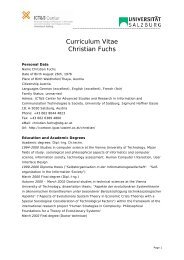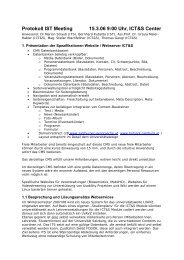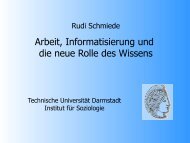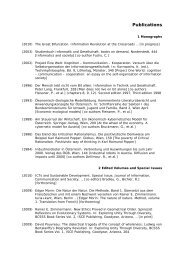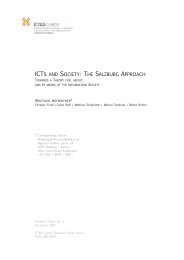CHRISTIAN FUCHS - ICT&S - Universität Salzburg
CHRISTIAN FUCHS - ICT&S - Universität Salzburg
CHRISTIAN FUCHS - ICT&S - Universität Salzburg
Create successful ePaper yourself
Turn your PDF publications into a flip-book with our unique Google optimized e-Paper software.
Christian Fuchs: Social Networking Sites and the Surveillance Societycyberprotest), and protest actions can besides in real space be organized as joint onlineactions (Co-operative cyberprotest) (Fuchs 2008: 277-289). Notions such ascyberprotest (Van de Donk/Loader/Nixon/Rucht 2004) and cyberactivism(McCaughey/Ayers 2003) have been coined for describing the organization of protestwith the help of ICTs.Online behaviour by studiVZ users in reaction to the planned change of the terms ofuse mainly operated on the cognitive (spreading the information) and communicative(discussing consequences and strategies) level, there were no co-operative endeavourssuch as setting up a petition against the new terms of use. A mass withdrawal fromstudiVZ would have been a form of electronic civil disobedience, but was unlikelybecause only some thousand users joined the groups, which is not a critical mass giventhe fact that studiVZ has several million users. Therefore it is not so clear if one caneven speak of cyberprotest in this case or only of an online information campaign. Oneweakness of the campaign was that many different groups were created, whichfragments the online public and does not create one overall platform of discussion andone impressive amount of users that can engage in co-ordinated actions. Adisadvantage of one overall group is that it is easier for the provider to shut down, keepunder surveillance, and control protest. Distributed cyberprotest is harder to control,but tends to fragment the protest public, whereas united cyberprotest is easier tocontrol, but creates a more powerful mass of activists.Those users who were unsatisfied with the new terms did not succeed in circumventingthe new terms of use. But the planned selling of user data to third parties was notincluded and is now explicitly barred in the new studiVZ terms of use. Our survey dataindicate that the online information campaign succeeded in drawing attention to theissue of surveillance by studiVZ and led a vast majority of users to disable advertisingoptions. Nonetheless personalized advertising and advertising messages per email andmessage service have been introduced and are now standard settings on studiVZ. ThestudiVZ information campaign did not attract a very large number of active users andseems not to have reached a co-operative level of protest, but it seems to havesucceeded in bringing many users to deactivate advertising options. But of courseadvertising and targeted advertising continue to exist on studiVZ, which means that theplatforms sells its users as an audience commodity to advertising clients in order toaccumulate money capital.Overall, media information and an online information campaign seem to be some ofthe causes of the high degree of knowledge and the high degree of critical informationbehaviour of the students in our sample in respect to studiVZ.79



